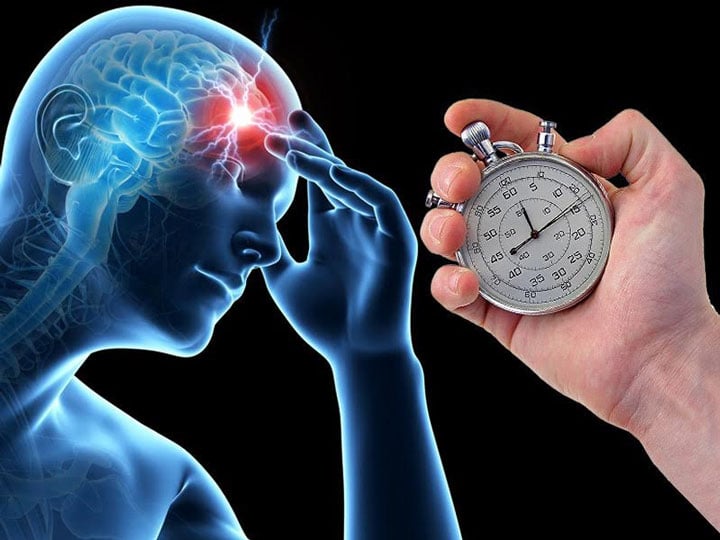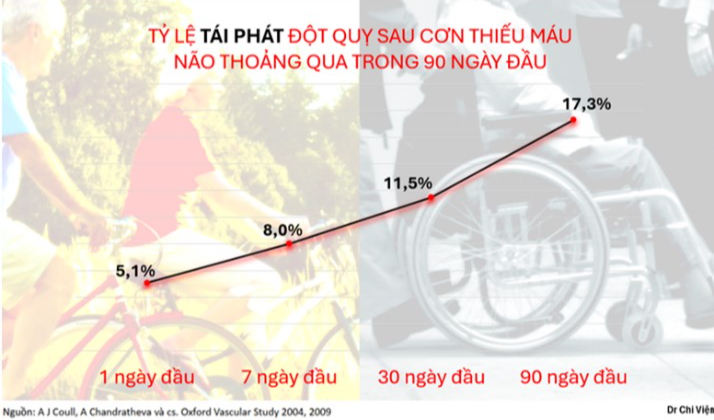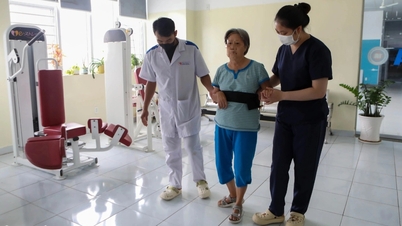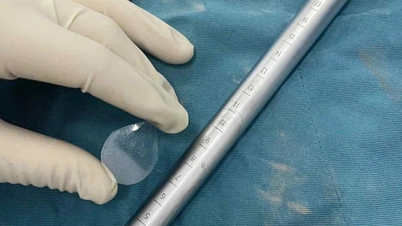GĐXH – According to doctors, transient ischemic attack is also known as transient cerebrovascular accident, the symptoms are quite similar to stroke but do not last long so it is often overlooked, leading to many unfortunate consequences.
Information from the Vietnam - Sweden Uong Bi Hospital said that this unit has just received a patient who was admitted to the hospital with complete paralysis of the left side of his body and a crooked mouth at the 7th hour of his illness.
Specifically, the male patient D.VN, 71 years old, has a history of high blood pressure. It is known that Mr. N had similar symptoms before and was admitted to the hospital. Here, after about 60 minutes, the symptoms recovered. Although the doctors explained the risks, the family insisted on going home because they thought the disease was not serious.
However, after returning home for about 4 hours, Mr. N's limbs and mouth were weak and gradually became more and more severe. At this time, his family took him back to the hospital. After examination, the patient was diagnosed with a cerebral infarction but the "golden time" for interventional treatment to revascularize the blood vessels had passed.
As a result, the patient's brain damage left him with complete paralysis of the left side of his body, a crooked mouth, difficulty eating and speaking.

Being subjective with transient ischemic attacks, many people come to the hospital late and experience unfortunate accidents. Illustrative photo.
According to Dr. Dang Thi Thu Vy, Head of the Department of Neuropsychiatry - Musculoskeletal, Vietnam - Sweden Uong Bi Hospital, the initial symptoms of patient N. were signs of transient cerebral ischemia - a warning of the risk of stroke. However, due to subjectivity, the family missed the best treatment time. As a result, the patient suffered from serious complications.
Do not be subjective with transient ischemic attacks
Dr. Tran Xuan Thuy, Department of Neurovascular Intervention, 108 Military Central Hospital, said that transient ischemic attack is a condition of temporary reduction or loss of local blood supply to the brain, manifested by localized neurological symptoms that occur suddenly and especially recover completely within 24 hours. Most transient ischemic attacks usually last less than 5 minutes and on average last about one minute.
Because the symptoms are transient, people often ignore them and do not go to the hospital. While these attacks can progress to become a real stroke, about 15% of patients with transient ischemic attacks have a stroke within the next 3 months. Half of them (7%) have a stroke within 48 hours.
According to doctors at the Stroke Department, Neurology Institute, 108 Military Central Hospital, transient ischemic attacks carry the risk of imminent real strokes. If the patient and his family recognize the warning signs and go to the hospital early, unfortunate consequences can be avoided.
However, in reality, most patients come to the hospital late, missing the "golden hour" for treatment. Right at the Stroke Department, doctors often record unfortunate cases where patients "felt a little numb and weak the night before, so they thought it was okay, and planned to go to the doctor the next day, but when they woke up in the morning, they couldn't walk anymore."
Transient ischemic attack has symptoms that begin suddenly, clearly with 4 characteristic signs as follows:
- Facial signs: When the two sides of the face look asymmetrical, one side of the face often sags.
- Voice signs: Patients have difficulty opening their mouth to pronounce words, in many cases they cannot speak clearly or speak long sentences.
- Signs in the hands: The patient has weakness or numbness in the hands, which can occur on one or both sides. When trying to move, the hands can fall down uncontrollably.
Through the symptoms of the disease, it is difficult to distinguish between a patient with a transient ischemic attack or a stroke.

Source: Department of Brain Stroke, Institute of Neurology, 108 Central Military Hospital.
Transient ischemic attack is a short form of neurological dysfunction, causing symptoms similar to stroke but usually lasting less than 1 hour. Therefore, this condition is less dangerous than stroke but should not be subjective, patients need to be closely monitored and treated to minimize possible sequelae.
Some studies have shown that the rate of stroke recurrence after transient ischemic attack is very high, in the first 90 days it is 17.3%, especially in the first days it is 5.1%, the first week is 8.0%. If there is a recurrence, the risk of severe sequelae is about 30%, the patient cannot move independently when discharged from the hospital.
Therefore, experts recommend that when detecting any warning signs of a transient ischemic attack, an ambulance should be called to take the patient to the hospital as soon as possible. Although it rarely causes serious neurological damage, if there is no intervention or delay, the patient will still face long-term consequences.
Patients need to clearly understand the symptoms of the disease, have effective prevention methods and early detection, timely intervention, and avoid unfortunate complications that may occur.
Source: https://giadinh.suckhoedoisong.vn/nguoi-dan-ong-bi-liet-nua-nguoi-vi-bo-lo-thoi-gian-vang-va-he-luy-dang-tiec-172241230110706996.htm


![[Photo] Hanoi morning of October 1: Prolonged flooding, people wade to work](https://vphoto.vietnam.vn/thumb/1200x675/vietnam/resource/IMAGE/2025/10/1/189be28938e3493fa26b2938efa2059e)
![[Photo] President of the Cuban National Assembly visits President Ho Chi Minh's Mausoleum](https://vphoto.vietnam.vn/thumb/1200x675/vietnam/resource/IMAGE/2025/10/1/39f1142310fc4dae9e3de4fcc9ac2ed0)

![[Photo] Keep your warehouse safe in all situations](https://vphoto.vietnam.vn/thumb/1200x675/vietnam/resource/IMAGE/2025/10/1/3eb4eceafe68497989865e7faa4e4d0e)



























































































Comment (0)